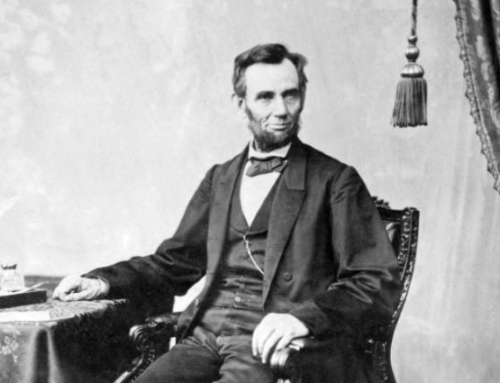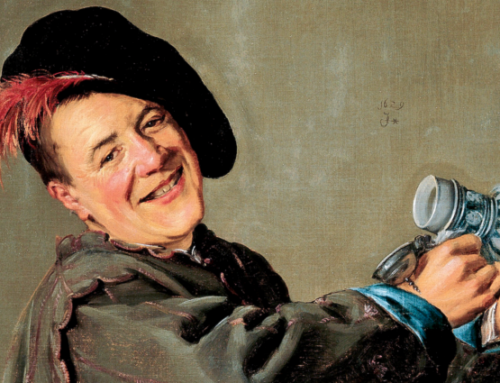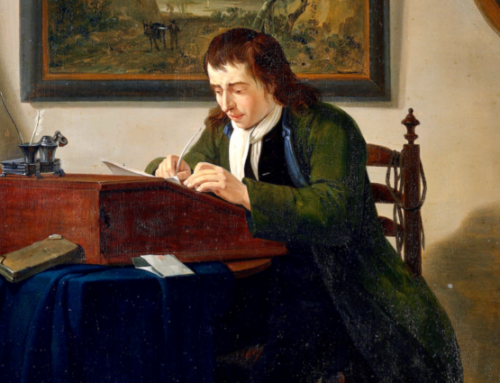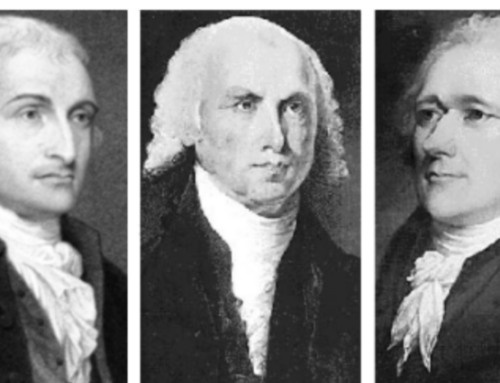 As a promising young centralist, Abraham Lincoln played the role of champion for what Professor Michael Oakeshott has called the “enterprise association” theory of the state.[21] While serving as the elected representative of Sangamon (1834—1842), he first made a name for himself by enacting this part. Joining with other soon-to-be forefathers of the Republican Party, the youthful projector had his first political victory with the ten million dollar Internal Improvements Act of 1837.[22] In effect, this legislation borrowed Illinois into an immediate bankruptcy and left upon the shoulders of each citizen of the state an obligation greater than his average annual income—a debt not finally retired until 1882. It was difficult for Lincoln to give up this dream of terrestrial beatitude brought about through fiat money, as, to be fair, was the case with many of his neighbors.[23] A peculiar feature of the legislation was that it actually discouraged free enterprise and private effort, though, thanks to its operations, many enterprising, private men (mostly Whigs) got rich. In the Illinois General Assembly, Lincoln’s preoccupations were special interest and local bills, log rollings and other things that government could “do for a community of people, [that] they need to have done, but can not do, at all, or can not, so well do, for themselves….”[24] In this helpful spirit, Lincoln loved a friendly bank, and learned how a pork barrel might best be filled. He became a master of patronage and influence. But his special concerns were roads, railroads, and canals. These works remained (in most cases) unfinished; or, if partially completed, they were underused and then sold at a loss. Yet by these disappointments, the “improvement” Whigs were not soon deterred. The power of the legislator was a veritable cornucopia, running on the formula of “tax and tax, spend and spend.” Lincoln mocked those who saw danger to the commonwealth in such adventurous, progressive schemes, calling their anxieties a “bugaboo.”[25] His eyes were fixed on the bright shape of Young America in the making—a composite personage whom he later describes in his “Second Lecture on Discoveries and Inventions”:
As a promising young centralist, Abraham Lincoln played the role of champion for what Professor Michael Oakeshott has called the “enterprise association” theory of the state.[21] While serving as the elected representative of Sangamon (1834—1842), he first made a name for himself by enacting this part. Joining with other soon-to-be forefathers of the Republican Party, the youthful projector had his first political victory with the ten million dollar Internal Improvements Act of 1837.[22] In effect, this legislation borrowed Illinois into an immediate bankruptcy and left upon the shoulders of each citizen of the state an obligation greater than his average annual income—a debt not finally retired until 1882. It was difficult for Lincoln to give up this dream of terrestrial beatitude brought about through fiat money, as, to be fair, was the case with many of his neighbors.[23] A peculiar feature of the legislation was that it actually discouraged free enterprise and private effort, though, thanks to its operations, many enterprising, private men (mostly Whigs) got rich. In the Illinois General Assembly, Lincoln’s preoccupations were special interest and local bills, log rollings and other things that government could “do for a community of people, [that] they need to have done, but can not do, at all, or can not, so well do, for themselves….”[24] In this helpful spirit, Lincoln loved a friendly bank, and learned how a pork barrel might best be filled. He became a master of patronage and influence. But his special concerns were roads, railroads, and canals. These works remained (in most cases) unfinished; or, if partially completed, they were underused and then sold at a loss. Yet by these disappointments, the “improvement” Whigs were not soon deterred. The power of the legislator was a veritable cornucopia, running on the formula of “tax and tax, spend and spend.” Lincoln mocked those who saw danger to the commonwealth in such adventurous, progressive schemes, calling their anxieties a “bugaboo.”[25] His eyes were fixed on the bright shape of Young America in the making—a composite personage whom he later describes in his “Second Lecture on Discoveries and Inventions”:
We have all heard of Young America. He is the most current youth of the age. Some think him conceited, and arrogant; but has he not reason to entertain a rather extensive opinion of himself? Is he not the inventor and owner of the present, and the sole hope of the future?... He owns a large part of the world, by right of possessing it; and all the rest by right of wanting it, and intending to have it. As Plato had for the immortality of the soul, so Young America has ‘a pleasing hope—a fond desire—a longing after’ teritory [sic]. He has a great passion—a perfect rage—for the ‘new’; particularly new men for office, and the new earth mentioned in the revelations…. In knowledge he is particularly rich. He knows all that can possibly be known; inclines to believe in spiritual rappings, and is the unquestioned inventor of ‘Manifest Destiny.’ His horror is for all that is old, particularly ‘Old Fogy’; and if there be any thing old which he can endure, it is only old whiskey and old tobacco.[28]
The tone of this passage is somewhat arch. But the content is a serious account of Lincoln’s perception of the nation in his day, especially when it is examined in the light of the prototype of this address, the earlier “First Lecture on Discoveries and Inventions. “[27] There he begins, “All creation is a mine and every man a miner. The whole earth, and all within it, upon it, and round about it, in his physical, moral and intellectual nature, and his susceptibilities, are the infinitely various ‘leads’ from which man, from the first, was to dig out his destiny.” From this image he moved swiftly to describe the peculiarly human enterprise as a work of refinement after the original extraction is complete. We are reminded of innumerable gnostic tracts, each in its own way concerned with the transformation of reality by “discovery” of what is hidden and the “invention,” through that discovery, of what is new. According to Lincoln’s Whig calculus, the alchemical transformation of the modern world by America is to be accomplished by applied science, ethical culture, and governmental manipulation: but especially by the last of these three, as directed by Whig statesmen who are able to sell their countrymen on the theologia civilis of high tariff, the Bank, and Mr. Clay’s “American System.” Only through their agency will the nation reach the “third age” of the Springfield Lyceum speech, the “Happy day when… mind, all conquering mind, shall live and move the monarch of the world.” Or come to declare in unison, “Reign of Reason, all hail!”[28]
This Lincoln, the genial prophet of expansion, modernization, and commercial progress, never really disappears, even when the man is absorbed into the myth. But if the prophet is to be also the agent and harbinger of these changes, the ultimate miner and refiner, then an attractive meliorist rhetoric must be developed to enforce his designs. And the key to that rhetoric would have to be the mythic articulation of a tempting vision of delights to come or likely to come, if just a few attendant suggestions are honored by a bemused electorate. Lincoln’s language in this period is, it is true, better suited to persuasion than to coercion. It is more carrot than stick, appeals less to order and strength and more to mendacity and opportunism than its model, the nationalist rhetoric of the old Federalist forefathers. But the constitutional progressivism of Whig doctrine required that it be so and also that it disguise some of its essential implications, lest their conflict with basic assumptions given authority by the Democratic opposition be recognized by the many Americans devoted to another view of the functions of the state. Lincoln did not give up on this idiom until he was convinced that the Whig cause was forever lost.
The basic tactic of Lincoln’s discourse as Whig loyalist was the argument from character, ad hominem. Its theoretical justification was a simple one: That it is difficult to market reason among unreasonable men. But its adoption by many Western Whigs has an even simpler explanation. I refer to the success of the Democrats in their perpetuation of the anti-statist momentum of the Revolution. As popular leaders since Jefferson have realized, Americans will accept some direction if they do not sense in the background an a priori design—an ideology whose agent shall be government, and whose authority shall be law. Lincoln became a specialist in the populist touch, in formal obeisance to “the genius of the people.” But there was a difficulty. For his use of the trope of affected modesty involved him in an endless series of deceptions and finally failed to launch him toward the eminence which he desired.
A summary example of Lincoln’s use of this device is available in his first reported speech. It is best to examine it in full, in a version preserved by one of his supporters:
Fellow Citizens, I presume you all know who I am. I am humble Abraham Lincoln. I have been solicited by many friends to become a candidate for the Legislature. My politics are short and sweet like the old woman’s dance. I am in favour of a national bank. I am in favour of the internal improvement system and a high protective tariff. These are my sentiments and political principles. If elected, I shall be thankful; if not, it will be all the same.[29]
As Richard Hofstadter has observed, Lincoln was “a complex man, easily complex enough to know the value of his own simplicity.” Therefore, he seldom “failed to strike the humble manner that was peculiarly his”—even though his adversaries recognized the demagogy of this self-dramatization and labeled him a Uriah Heap.[30] Moreover, he kept it up to the end, describing his life as “the short and simple annals of the poor” and advising his campaign biographer in 1860, “I wish it to be modest.”[31] In this vein, we should understand the cultivated image of the rail-splitter, the teller of bawdy or racist tales, the tall, ungainly figure in the rusty hat and worn shawl.[32] Our point is that the matter hidden behind this Jacksonian exterior belonged to another politics—a system in harmony with the Federalist/Whig model—and involved Lincoln in a persistent deception. Many Whigs had disguised themselves in the same way, particularly after the successful campaign of William Henry Harrison.[33] But none had done so with greater skill than the prairie lawyer from central Illinois.
Yet the problem of conflict between tenor and vehicle in the speech and writing of Abraham Lincoln goes well beyond conventional political obfuscation by the party of privilege and imposed rational reform in a traditionalist, socially conservative, and closed republican regime. In the record of Honest Abe, deceit by conflation is everywhere, all of it asserting innocence, either of motive or of design. Consider, for an instance, his last letter to Mary Owen, where he offers marriage in such a way as to sever their connection forever.[34] Or his claim to James Shields, a prominent Democratic politician, that a newspaper attack directed at him was in no way “personal” and had been made “wholly for political effect.”[35] Even though the piece describes Shields as a “fool” and “liar”; as a “dunce” who can be identified by his smell; and, through his suborning perjury, as a source of political corruption.[36] Or perhaps his handbill on religion, issued at the time of his race for Congress: An open disapproval of scoffers (overt skeptics, as opposed to secret unbelievers like himself), which he means to be read as a profession of his own Christian orthodoxy.[37] Or, finally, his antislavery law for the District of Columbia—a measure which did to death a serious Congressional effort to outlaw the peculiar institution in that jurisdiction.[38] Lincoln’s conduct in this piece of business, his principal legislative venture during his only term in the House of Representatives, infuriated the antislavery men in that body, released him to oppose other antislavery legislation, and caused one of his Northern colleagues to write that he had, in the entire dispute, “placed himself squarely on the side of the South.”[39] Yet he often identified himself as a “free soil” man, and managed to get his share of the “Yankee” vote in the seventh congressional district.
If we are careful to read the public life of Lincoln from the beginning, forward, this unfriendly report by an abolitionist should not surprise. In these years, the future Emancipator ran always with Southern Whigs. His presidential preferences were always for slaveholders who helped cut down the Democratic majority in the South—for Clay and White, Taylor and Scott. In 1852, he praised his party for pacifying Southern fears, for refusing to claim a special understanding of the Divine Will, and for avoiding all arguments from definition, direction by abolitionists, or original uses of presidential power.[40] Moreover, he did not scruple at condemning Martin Van Buren for entertaining too advanced a view of the rights of Negroes,[41] or at bringing actions for the recovery of runaway slaves in Illinois. Devotees of the Lincoln myth have a dreadful time with his role in the celebrated Matson Slave Case of 1847. Their trouble is that they identify his politics with freedom of the Southern Negro. And that belief leads them to misconstrue what was his larger purpose, from the first.
It was no inconsistency for Abraham Lincoln the orthodox Whig, the protegé of John Todd Stuart and the aristocratic Edwards clan, to go down to Coles County and seek there his fee for returning Jane Bryant and her four children to Kentucky: A place of bondage from whence (we are led to believe) they would soon thereafter have been shipped “down the river” in punishment for the inconvenience they had caused.[42] These Negroes were property. And for any good Whig, respect for the primacy of property rights was an absolute article of faith. Equality was no important part of their teaching, and received their lip service only in passing when it was time to vote. For the ordinary Whig, equality signified economic opportunity for citizens, with the meaning of that status being defined by law. Slavery agitation divided American citizens and precluded the development of a more perfect unity through commercial exchange: A development encouraged by a benevolent government authority. The Whigs recognized that slavery itself had fostered sectionalism. Therefore, they expressed a pro forma interest in systems of voluntary manumission if linked (where necessary) to compensation and also (in every case) to African repatriation. The Whigs were uniformitarians to the core. And once the Negroes were gone, the South might be less uneasy about concentration of federal power and more concerned with commercial expansion: less provincial and agrarian. Local feeling and variety were the enemies of the Whigs. They connected both with the passions; and passion forestalled the evolution of the Union which, in standard progressive fashion, they defined more by what it could be than by what it was or had been. But the Constitution had made us “half slave and half free.” And to argue from definition against a part of that settlement could only aggravate the situation which they officially deplored.
It is true that the Whig vision of the national future had more in common with Pleasure Island in Pinocchio than with the old Puritan City on a Hill. (At times, in speaking of it, even Lincoln sounds like the poor boy with his face frozen against the window of the candy store.) But as a secular utopia, it commanded the allegiance of many Americans, certain that destiny was on their side, that our nation could bring all history to a rational apotheosis. Therefore, they could afford to wait. Accommodation was their watchword in dealing with certain unreasonable particularities. In the end, rational arguments of enlightened self-interest would prevail. They were ready to describe their conservative opponents as wrong, but they would not call them wicked. For such “high profile” arguments heated up the political atmosphere and turned attention away from the considerations to which they gave priority—away from trade. Unlike their rhetorical modus vivendi, these contentions delayed the destined surrender of their countrymen to the teleocratic state, kept alive centrifugal impulses in the body politic, and kept the Democrats in power. The political rhetoric of Abraham Lincoln prior to 1854 conforms entirely to these Whig presuppositions. He had played the game by their rules. But by that time the sectional issues had clearly ruined the hopes of the Whigs in the South. They could not outbid the hated “Locos” there, for these astute enemies had done their best with the raw material of Southern ambition and Southern fear. The alternate strategy was to build a party with a regional base in the North, drawing its strength from former Whigs and former Democrats who resented what Southern “demands” had done to the “house of their fathers”: to make capital out of what appeared to be a disadvantage.[43] This procedure would involve an almost total violation of the reasonable precepts of the Whigs. It would work openly on the passions and diminish national feeling—at least for a while until one side had won a total victory. Yet as an extremely partisan politician, a man who would do almost anything to defeat the Democrats, Lincoln was not likely to ignore this situation, or to misjudge where it led.[44] As early as 1848, he had agreed with William Seward that “if one had no hope of getting elected on the internal improvements issue, one other issue offered opportunity. ‘I reckon you are right, Senator. We have got to deal with this slavery question, and got to give it more attention hereafter than we have been doing.'”[45] The Kansas-Nebraska Act gave him that opportunity.
Stephen A. Douglas, United States Senator from Illinois, was the author of the Kansas Nebraska Act. Douglas was Democratic leader in Congress. The bill was a Democratic measure, repealing the Missouri Compromise of 1820, and leaving the status of the undeveloped territories to be settled by popular sovereignty—first upon their organization, and then again upon their application for statehood. It denied any role to the federal government in making these determinations, and thereby it attempted to close out the possibility of future political debate over the institution of slavery. Senator Douglas hoped that it would launch him upwards into the White House. Instead, it revived the faltering political career of Abraham Lincoln and gave him the issue he required to become the politicus of his youthful speculations.[46] The method employed by Douglas’ old adversary in exploiting the anger of the people of the North at the opening of Southern development of lands which they thought were reserved for their use was extremely artful. It seized upon the fact that the issue in dispute was one of cultural identities, and that slavery was only the circumstance which allowed for its unfolding. And it exploited that opportunity to the hilt.
Northern outrage at the Kansas-Nebraska Act developed swiftly. Lincoln recognized its dimensions almost at once. And he began to convert it to Douglas’ (and the Democrats’) disadvantage, to the development of a Northern sectional party, in his Peoria address of October 16, 1854.[47] Though it sounds many new notes, its rhetoric is in some respects transitional. It makes a conventional nod to the example of his “beau ideal,” Henry Clay and to the moderate example of his Springfield preceptors. Their opinion is acknowledged in Lincoln’s reference to “compromise,” and “concessions” or “equivalents” as a normative concept in previous quarrels between the sections.[48] Lincoln admits that the Constitution itself rests upon that principle—in recognition of the original, nonnegotiable variety of the United States.[49] It is, therefore, Stephen Douglas and not his critics who has broken with the authority of precedent. The rest of Lincoln’s argument in this pivotal address does not consort well with this complaint against innovation; though he pretends here to be only the “honest citizen” alarmed at change—the forensic “good man, speaking well” of Cicero’s definition.
For the great difficulty with Lincoln’s Peoria presentation is that it finally refuses accommodation, the sacrosanct principle of Clay and of the Founders, and in its place threatens apocalypse if the alternate principle of exclusion is not applied to all the Western territories of the Republic. To accept the notion that there is any policy superior to these alternatives is called both “monstrous” and worthy of “hate.” We are now returned to the false dilemma. Ordinary persuasion is forsworn. A new political religion is implied. And though Lincoln still pretends civility and claims not “to question the patriotism or to assail the motives of any man, or class of men,” we are well on our way to a full-fledged Puritan rhetoric of perpetual war against the “powers of darkness”: “two universal armed camps, engaged in a death struggle against each other.”[50] The speech is rambling, full of historical errors, and, as Professor Riddle has observed, more distinguished for its intensity than for the muddle of what it contends.[51] But its burden cannot be misunderstood: The Northwest Ordinance of 1787 should be applied to all the undeveloped portions of the United States, in the spirit of the Wilmot Proviso, and therefore the balance of the sections forever destroyed. Otherwise, according to his new bugbear, slavery will be released and encouraged to spread throughout the land. And all of this to come to pass because of Stephen A. Douglas and his “declared indifference, but as I must think, covert real zeal” for such a change.[52]
Thus Lincoln cries “conspiracy,”[53] a note which becomes stronger and stronger in the speeches that are still to come. We are diverted by his tone, as we are by the stridency of his censure upon a people toward whom he has “no prejudice,” and against arrangements that are “in the Constitution.”[54] Yet it points us toward what was finally at stake in his effort to repeal the Kansas-Nebraska Act and in the entire discussion of the territorial expansion of the slave power. As I noted above, Lincoln makes use of a fallacious argument from history, and a particular appeal to the authority of the Northwest Ordinance. These new politics undertook to threaten the sense of identity in the people of the Midwest. They felt that the lands to their immediate west were symbolically marked as theirs by the old line of compromise and the label “free soil.” Such had been the true purpose of the Northwest Ordinance at the time of its adoption.[55] But in the dialectic set in motion in Peoria that promise could not be made secure unless all open lands were covered by the Ordinance, or its near equivalent, with the balance of power designed by the Fathers tilted northward and against the Democrats. At times Lincoln seems to moderate this demand in his first attack on slavery as polity, but the concessions are only for effect, particularly as he approaches the Illinois senate race of 1858.
This is the second essay in a three-part series; the first part may be found here. Republished with gracious permission from Modern Age (Winter 1979).
Notes:
[21] Oakeshott, Michael On Human Conduct (London: Oxford University Press, 1975), pp. 114-118, 157-158, and 315-317. As opposed to what he calls a “civil association.”
[22] Paul Simon, Lincoln’s Preparation for Greatness: The Illinois legislative Years (Urbana: University of Illinois Press, 1971), pp. 48-53.
[23] Though not true of thoughtful men like Governor Joseph Duncan.
[24] The Collected Works of Abraham Lincoln (New Brunswick, N. J.: Rutgers University Press, 1953), vol. II, p. 220.
[25] Simon, p.262. As he later mocked those who saw in his campaign a threat to the Union. See his speeches from Nov. 1800—April of 1861.
[26] Collected Works, III, pp. 356-357. Young America was a progressive movement, expansionist, chauvinistic, and usually Democratic.
[27] Collected Works, II, pp. 437-442.
[28] Collected Works, I, p. 279. The peroration of the “Temperance Address.”
[29] Conveniently available on pp. 65-66 of Lord Charnwood’s Abraham Lincoln (New York: Henry Holt and Company, 1917).
[30] Richard Hofstadter, The American Political Tradition (New York: Alfred A. Knopf, 1948) p. 94; see also Richard H. Luthin, The Real Abraham Lincoln (New York: Prentice-Hall, Inc., 1960) p.37.
[31] See p. 4 of Stephen B. Oates, With Malice Toward None: The Life of Abraham Lincoln (New York: Harper & Row, Publishers, 1977); also Collected Works, III, p. 511.
[32] See Luthin, p. 229.
[33] Those who did not failed-belated Federalists like Lincoln’s sponsors, Ninian Edwards and John Todd Stuart.
[34] Collected Works, I, pp. 94-95; Letter of Aug. 16, 1837.
[35] Collected Works, I, p. 301; “Memorandum of Duel Instructions to Elias H. Merry man,” Sept. 19, 1842.
[36] Collected Works, I, pp. 294-296.”The ‘Rebecca’ Letter,” Aug. 27, 1842.
[37] Collected Works, l, p. 382; July 31, 1846. See also Luthin, p. 169, where we see Lincoln pretending rigid Christian orthodoxy, for effect.
[38] Collected Works, II, pp. 20-22; see also Riddle, pp. 162-180.
[39] See p. 260 of George Washington Julian’s The Life of Joshua R. Giddings (Chicago: A.C. McClurg and Company, 1892). The book is very useful to students of Lincoln’s views on slavery.
[40] Collected Works, II, pp. 135-157, “Speech to the Springfield Scott Club,” Aug. 14, 1852—perhaps Lincoln’s finest speech.
[41] Simon, p. 136. In this campaign Lincoln made race baiting speeches all through “Egypt”—the lower counties of Illinois. See also Collected Works, I, pp. 209-210.
[42] See pp. 130-149 of John J. Duff’s judicious A. Lincoln: Prairie lawyer (New York: Rinehart & Company, Inc., 1960). This is an instructive narrative of the entire 1847 case for those who are inclined to take seriously Lincoln’s statements on one man “living by the sweat of another man’s brow.” Lincoln tried his best to do a bit of that living.
[43] Also part of the plan was to push the Democrats still further South, by driving the Southerners to make greater and greater demands upon “their party.”
[44] See for an instance Roy P. Basler’s edition of The Collected Works of Abraham Lincoln (New Brunswick, N. J.: Rutgers University Press, 1953). Further references in this paper to Basler’s edition will be abbreviated to Collected Works. III, p. 330—Lincoln’s letter to Norman B. Judd, Oct. 20, 1858. There he advises his associate on how to steal illegal Irish votes.
[45] Quoted by Donald W. Riddle’s Congressman Abraham Lincoln (Urbana: University of Illinois Press, 1957), p. 246.
[46] Ibid., pp. 245-249.
[47] Collected Works, II, pp. 247-283.
[48] Ibid., pp. 259 and 272.
[49] Ibid., p. 272. It is to the point that Northerners, in 1787, had, without moral outrage, agreed to slavery in the South. And could not thereafter develop an outrage with that portion of the contract between the states without acknowledging that their anger “broke the bond.” Especially if this belated morality was to their political and economic advantage. And had come upon them only after they were convinced that the Union was not subject to dissolution. Under the pressure of such convenient outrage Southerners were quite naturally distrustful of attendant assurances that the letter of the contract would be observed. The form of these disclaimers of innovative intent was their meaning. Had the North in 1787 accepted slavery in this way, there would have been no Union.
[50] Collected Works, II, 248; The New Science of Politics, p. 151.
[51] Riddle, p. 249.
[52] Collected Works, II, p. 255.
[53] See David Brion Davis, The Slave Power Conspiracy and the Paranoid Style (Baton Rouge: Louisiana State University Press, 1969).
[54] Collected Works, II, pp. 254 and 269.
[55] See pp. 231-232 of The Antislavery Vanguard: New Essays on the Abolitionists, ed. by Martin Dubennan (Princeton: Princeton University Press, 1965). The passage which I cite is from Staughton Lynd’s essay, “The Abolitionist Critique of the United States Constitution.” In it he observes that most of the Fathers expected the South to outgrow and outpopulate the North. The South also held rights to most of the Western territories. To set aside the Old Northwest for non slaveholders was a way of giving the North a reason to “join the Union”—a stake in its future and a way of extending the principle of balance of the sections into the future, while at the same time assuring that the new nation (with the slave trade still in operation) would not become altogether surfeited with slaves, to the decrease of their value and the increase of social danger. The very Southerners who adopted the Northwest Ordinance spoke repeatedly of their expectation that slavery would go into the West. And so voted, with many Yankees, in the Southwest Ordinance. (Jefferson himself endorsed such a distribution.) Lincoln’s reading of these events is ridiculous—and borrowed from Salmon Chase of Ohio. To argue that the South voted to extinguish itself in 1787 is to ask that we believe a thing not in nature.







As a historical footnote, some might find it interesting that Bradford “almost” became head of the National Endowment for the Humanities under President Reagan, and was supported by Senator John East, whose great writings can also be found on this website. But he was derailed because of his writings “against Lincoln” (such as this article) which were definitely taken out of context, and twisted into a pro-slavery position. Very unfortunate, and certainly against the spirit of free and open inquiry that a promoter of the humanities should be about.